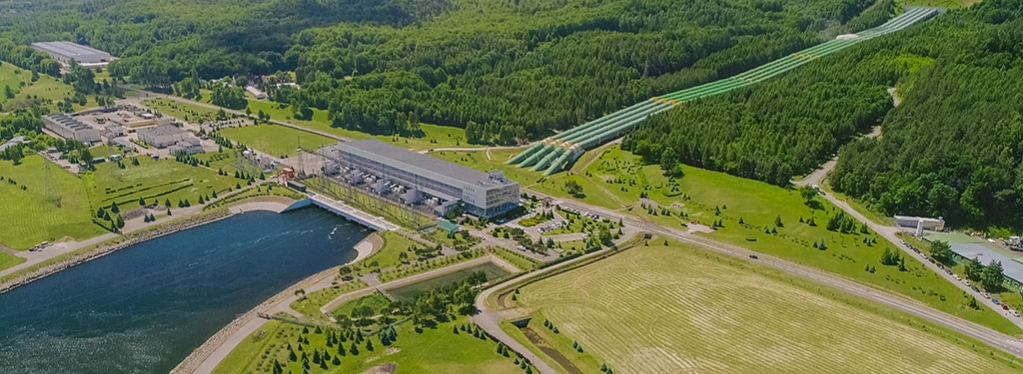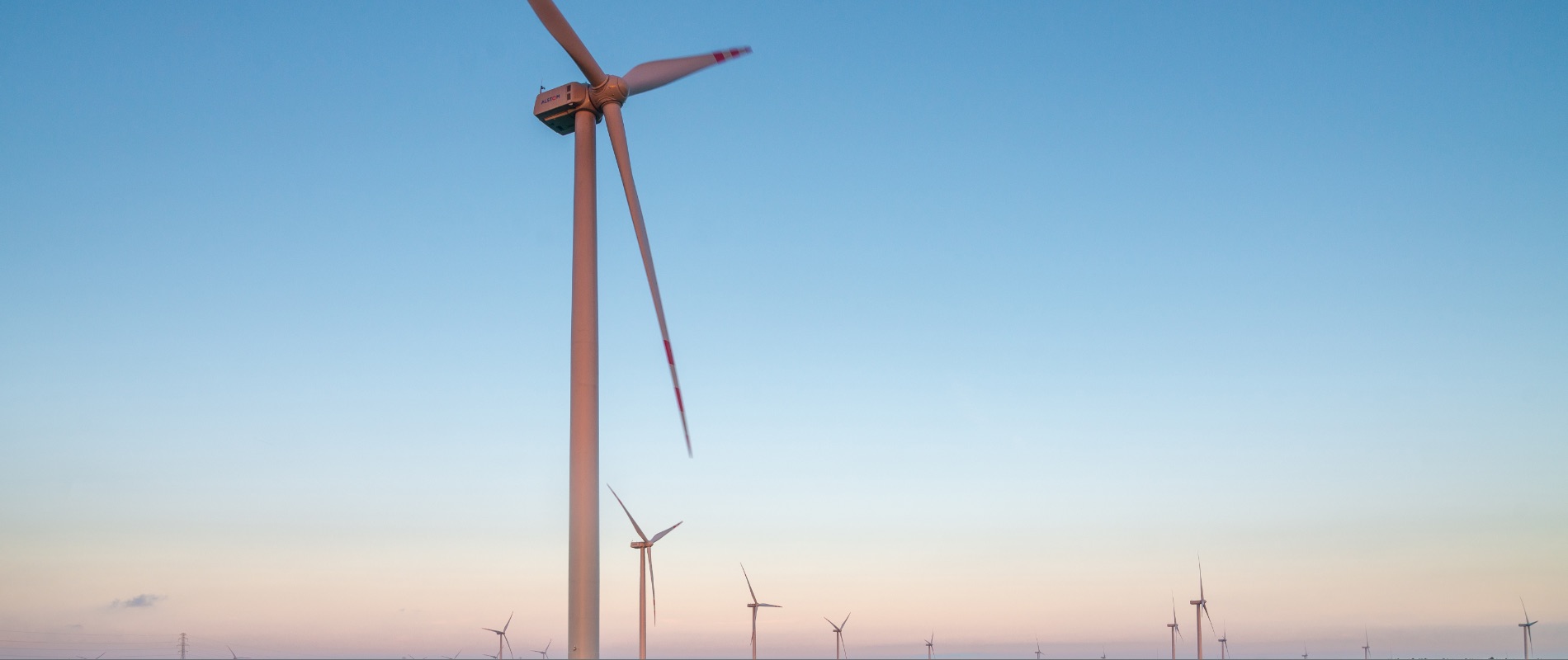- PGE’s vision
- Sustainable transformation
- PGE in 2020
- About the report
- Interactive data
One of the factors influencing the achievement of climate neutrality by PGE Group by 2050 is the implementation of the principles of a circular economy in all areas of activity. In our activities, we are guided by the idea of respecting resources. Their use reduces the need for their production with traditional methods, contributing to the reduction of greenhouse gases emissions.
The EU’s circular economy package reduces, and ultimately eliminates, landfilling and is a challenge for the energy and mining sectors. PGE follows the principles of the circular economy, seeking the widest possible application for the produced by-products of combustion. Closing the circulation of raw materials and increasing the degree of their utilisation is an important process in PGE Group due to the growing importance of efficient use of resources, reduction of waste generation in favour of by-products and minimisation of environmental impact.
By-products of combustion are the result of electricity and heat production in power generation units fired with fossil fuels. The management of combustion by-products at PGE Group turns waste into high-value substances that are used in other branches of economy (cement industry, construction, road-building, mining) and thus reduces the volume of ultimate waste generated. In 2020 alone, a total of 4.33 million tonnes of valuable commercial materials, including ash, slag and gypsum from flue gas desulphurisation systems, were generated in power plants and combined heat and power plants belonging to PGE Group during the production of electricity and heat.
The re-use of combustion by-products in various branches of industry has tangible benefits for the environment. The nuisance of landfills for people and the natural environment is reduced as there is no need to allocate new land for building them and the accompanying infrastructure.
By-products of combustion successfully replace natural raw materials (e.g. natural gypsum, aggregate), thus reducing their extraction as well as emissions that accompany their extraction. The responsible use of secondary raw materials, such as gypsum from flue gas desulphurisation plants, is a good example of implementing the principle of priority for secondary raw materials in economic processes. Such measures help to protect fossil resources for future generations.
Another important aspect is the reduction of greenhouse gas emissions in production cycles that use combustion by-products. A case in point is the reduced carbon footprint of cement production processes using fly ash or gypsum board production processes using synthetic gypsum. The use of ash with a high calcium content from commercial power generation reduces CO2 emissions that accompany the industries producing traditional binders such as cement or lime. In this way, the conventional power generation sector contributes to the avoidance of CO2 emissions due to the use of combustion by-products supplied from power plants to cement production factories. According to a report prepared by the National Centre for Emissions Balancing and Management, thanks to the production of binders from combustion by-products, which successfully replace cement and natural lime in selected geotechnical applications – mainly in road construction, CO2 emissions can be reduced by almost 568,000 tonnes over a period of five years.
Since the beginning of its operations, PGE has been gathering knowledge on the anthropogenic minerals produced in consequence of its activities. The reuse of by-products of combustion has accompanied the energy and heat generation sector for over 20 years. Measures taken by the PGE Group and aimed at closing technological cycles are in line with the European Union’s policy oriented towards the industrial use of by-products, the protection of natural resources and the minimisation of adverse environmental impact.
The following processes and assets are classified as being in line with the circular economy principles:
Cement and concrete manufacturers, ceramic producers, as well as mining and road construction companies benefit from the use of proven and safe solutions. Products made using combustion by-products meet all the requirements applicable to building materials and products.


Anthropogenic minerals produced in PGE, such as gypsum from flue gas desulphurisation plants, ash and slag or ash-slag mixtures used as raw materials for production are subject to a number of tests before they are granted a marketing authorisation. The process of using anthropogenic minerals in the construction industry is supervised by the Building Research Institute. The products have been registered under the international REACH system. As part of the registration, combustion by-products have undergone comprehensive toxicological, ecotoxicological and mutagenic tests in accordance with the requirements set out by the European Chemicals Agency (ECHA). Tests carried out in laboratories of the highest world standard have unequivocally confirmed that these substances are safe and pose no threat to humans, animals and the environment.
Synthetic gypsum (calcium sulphate) produced in flue gas desulphurisation installations in power plants and cogeneration plants within the PGE Group (Bełchatów Power Plant, Opole Power Plant, Dolna Odra Power Plant Complex, Turów Power Plant, Cracow Combined Heat and Power Plant, Wybrzeże Combined Heat and Power Plant), whose generation technologies are based on the wet lime method, has properties similar to those of natural gypsum and can successfully replace its natural equivalent. Differences between natural and synthetic gypsum in terms of chemical composition and trace element content are insignificant. Synthetic gypsum is widely used in the building industry, for example in the production of plasterboards.
In connection with the application of calcium-based flue gas desulphurisation methods in power plants and combined heat and power plants belonging to the PGE Group, synthetic gypsum is produced, which turns out to be a good substitute for natural gypsum, and the majority of the substance’s components (99 percent) are compounds identical to mineral substances of natural origin. In 2020 alone, 2.43 million tonnes of gypsum from flue gas desulphurisation systems were produced in the PGE power plants and combined heat and power plants.
By-products of combustion are also used in the rehabilitation and macro-levelling of post-industrial and degraded land, restoring many areas to their former landscape and natural conditions. They are also widely used in the mining industry to protect the structural integrity of pits
Tasks in the field of circular economy are planned within the companies dedicated to support and conduct activities in the field of waste and combustion by-products management, i.e. PGE Ekoserwis sp. z o.o. and Epore sp. z.o.o..
With regard to the management of waste and by-products of combustion in PGE Group companies (PGE Górnictwo i Energetyka Konwencjonalna and PGE Energia Ciepła), there are specific technical and geographical conditions, but the main objective is their economic utilisation instead of storage in landfills
The PGE Group operates one Thermal Waste Processing with Energy Recovery (TWPER) plant in the city of Rzeszów. This plant is located on the premises of the existing combined heat and power plant, in the direct vicinity of the reloading base as well as the sorting and composting plant of the Municipal Utilities Enterprise. This allows a controlled and safe recovery of energy from municipal waste and the simultaneous generation of electricity and heat. The applied technology is environmentally safe, modern and proven in over 300 cities around the world. Thanks to the use of state-of-the-art filters, the plant meets the strictest EU requirements for environmental standards. It is also a major step towards the complete elimination of landfill in the region.
Two new investment projects will be realised by PGE Energia Ciepła as part of the circular economy initiative:
Both projects are currently at the preparatory stage and are to be launched in the years 2023-2024.
Thermal waste processing with energy recovery plants are an indispensable element of a sustainable circular economy due to the reduction of waste stored in landfills and its thermal processing generating electricity and heat.


Oil management is an example of using the principles of a circular economy in the PGE Group companies. Necessary for the correct functioning of hydro- and turbine-sets, oil is treated and purified for reuse on an ongoing basis. Systems are in place to minimise oil consumption and maximise oil reuse (e.g. systems for filtering and capturing oil vapour, leakproof oil sumps, separators and oil separators.
The activities of the PGE Group companies, in particular the generation of electricity and heat in power plants and combined heat and power plants, result in the production of waste that cannot always be reused or utilised. With a view to protecting natural resources and minimising the adverse impact on the environment, the activities of the PGE Group are aimed at reducing the volume of waste deposited in landfills.
The Group companies use their resources reasonably. The rehabilitation of post-industrial sites is an integral stage in the process of terminating mineral extraction operations. The decommissioning of pits is aimed at making them usable and restoring them to the environment.
The generated volume of hazardous waste decreases year by year. For the entire PGE Group, a reduction of approximately 2.8 percent was observed in 2020 compared to 2019. In 2020 only PGE Energia Odnawialna produced a greater volume of waste than in the previous years. This was related to the modernisation works carried out in the Dębe Hydroelectric Power Plant, including the disassembly of the hydrosystem, and auxiliary installations. Such waste is transferred to an authorised waste management entity.
The generated volume of hazardous waste decreases year by year. For the entire PGE Group, a reduction of approximately 2.8 percent was observed in 2020 compared to 2019. In 2020 only PGE Energia Odnawialna produced a greater volume of waste than in the previous years. This was related to the modernisation works carried out in the Dębe Hydroelectric Power Plant, including the disassembly of the hydrosystem, and auxiliary installations. Such waste is transferred to an authorised waste management entity.
Particularly noteworthy is the significant reduction in the generation of non-hazardous waste. Across the PGE Group, 5.28 million tonnes of non-hazardous waste was generated in 2020, which was over 12 percent less than in 2019.
The development of the Live Working technology, which is considered to be a modern technology of conducting power network operations without the necessity of shutting down power supply lines, influences the maintenance of the quality standards of the transmission and distribution services, as well as reduces losses in the transmission of electricity. An important advantage of the Live Working technology is also the extension of the operating time of switching devices (disconnectors, interrupters and circuit breakers), which has an impact on reducing the amount of waste generated in this area.